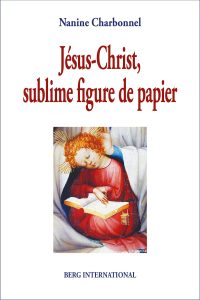 Not only are passages from Jewish Scriptures identified as sources of the gospels but we also find interesting overlaps with some of the other Second Temple literature and even the later rabbinical writings. It looks as though those later rabbinical writings originated in the Second Temple era given the striking overlaps with some of the gospel passages. I have noted and linked these references in the tables up till now but mention it this time because there seem to be more than usual in today’s table.
Not only are passages from Jewish Scriptures identified as sources of the gospels but we also find interesting overlaps with some of the other Second Temple literature and even the later rabbinical writings. It looks as though those later rabbinical writings originated in the Second Temple era given the striking overlaps with some of the gospel passages. I have noted and linked these references in the tables up till now but mention it this time because there seem to be more than usual in today’s table.
Very often the proposed allusions to passages in the Hebrew Scriptures are not direct but are nonetheless thought-provoking and raise questions about the possible mind-sets of the authors. One of the more interesting associations for me was the associations with Jesus writing in the dust. I know that the passage about the woman caught in adultery has had a checkered history in the manuscripts but here there is a reasonable case for interpreting it as having been composed with the same midrashic imagination as other gospel passages.
Another passage of particular interest was the association of Jesus’ instruction to eat his flesh with the words of Wisdom in Sirach. Not such a “pagan” or “mystery-religion” notion, after all, in that context!
The table below comes with the same notes as the earlier ones, paraphrases in parts, translations are my own, and slight editorial changes here and there. One difference, though — I have colour-coded rows to link together verses addressing the same unit of narrative.
Here we look at the Jewish Scripture sources for:
a. the Transfiguration and preparation for the Passion of Christ
b. signs of the End Times
c. miracles and teachings in Jesus’ last days
d. Last Supper and Betrayal
|
The table is primarily a translation and slight modification of pages 183-226 of Nanine Charbonnel’s Jésus-Christ, sublime figure de paper. All posts archived here. (I have added the images)
|
| Matthew 17:1-9; Mark 9:2-10; Luke 9:28-36 The Transfiguration | |
| after six days | cloud of glory covers Sinai for six days Exodus 24:18 |
| the mountain | = Moses on Sinai |
| Moses = the Law | = Moses shines with glory Exodus 34:29 |
his face shone like the sun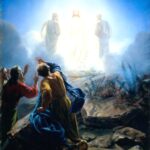 |
Psalm 80:3 Make your face shine on us + Numbers 7:89 “When Moses entered the tent of meeting to speak with the Lord, he heard the voice speaking to him from between the two cherubim above the atonement cover on the ark of the covenant law. In this way the Lord spoke to him.” Parashat Nasso, read at the Festival of Tabernacles |
| Elijah = the Prophets | Elijah 1 Kings 19:11 + Elijah appears before the end-time, Malachi 3 + Devarim Rabbah 3 : YHWH says to Moses that in the last days, He and Elijah will come together [DFS] (I am unable to find what DFS stands for. Please notify me if you know. Thanks) |
| the three witnesses: | Moses ascends with three companions, Aaron, Nadab and Abihu (Exodus 24:1) |
| Peter, John and James | + corresponding to Reuben, Judah and Levi, are the three elders of Jacob-Israel… On the breastplate of the High Priest their stones engraved with their names are at the head of the three rows of four. |
| talking with Jesus about his departure (exodus) | = the Exodus of the people of Israel |
| the cloud | manifests the presence and glory of God: Exodus 13:21-22; 16:10; 19:16; 40:34-35; Numbers 16:42 |
| fear | = the fear of Moses in the theophany of the Exodus (+ Hebrews 12:21) |
| Our Father | |
| Hallowed by thy name
(thy kingdom come) |
= Leviticus 22:32; Isaiah 29:23; Ezekiel 36:20-23 + Kaddish: “May His great name be exalted and sanctified (Amen) — In the world which He created according to His will! — May He establish His kingdom and may His salvation blossom and His anointed be near. (Amen) |
| Matthew 25:40 “whatever you did for one of the least of these brothers and sisters of mine, you did for me.” | = Midrash Tannaim on Deuteronomy 15:9 “My children, if you have given food to the poor, I will count it to you as if you had given it to me.” |
| Mark 10:38 “Can you drink the cup I drink?” | Drinking of a cup is a metaphor for divine punishment: Habakkuk 2:16 |
| Mark 10:45 “to give his life as a ransom” (monetary compensation) | Ruth 3:9 The redeemer; Isaiah presents God himself as the redeemer (Isa 49:7), “the one who redeems you is the Holy One of Israel” Isaiah 43:14 ; “Israel’s King and Redeemer” Isaiah 44:6. |
| Matthew 17:24-27 To pay the Temple tax | = to be redeemed |
| to draw the ransom money from the sea | to draw from the water as Moses was (Exodus 2:10) |
| the first fish | = the firstborn = Israel (Exodus 4:23) |
| whose mouth contains the coin (statēra) | the word of the Messiah (resurrected fish like Jonah) is the stater = 2 (sic) drachmas, the price of the redemption and of the Jews and the pagans |
| Matthew 20:29-34 Healing the Blind | = Isaiah 35:5 The Messiah will make the blind see + Tobit 11 The blind Tobiah was healed by the fish (medicine) |
| John 9 with mud (saliva plus earth) | = new creation |
| Healing the Paralytic | Isaiah 35:3, 6 “In messianic times, it is said, “with paralyzed knees, be full of strength!” + Paralytic = gentile (who does not practise the Halakha, walking in the way) |
| Mark 13: End Times | The coming of the Messiah |
| Mark 14:51-52 51 A young man, wearing nothing but a linen garment, was following Jesus. When they seized him, 52 he fled naked, leaving his garment behind. | Amos 2:16 In the day of the wrath even the bravest warriors will flee naked on that day. [Salomon Reinach, 1907; M. Mergui] |
| Matthew 25:31 Jesus said of his coming, When the Son of Man comes in his glory and all the angels with him… | = Daniel 7 |
| John 5:28-29 The hour is coming when all who are in the tombs will hear her voice and come out | = Elijah, 1 Kings 17:22-23 resurrection of the son of the widow of Zarephath |
| Luke 7:14-15 Resurrection of the son of the widow of Nain, “and he gave him to his mother” | = the same words in the Septuagint, “and he gave him to his mother” |
John 11 the Resurrection of Lazarus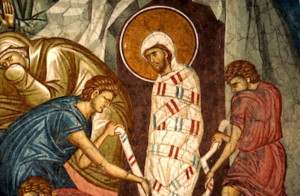 |
Lazarus (God Helper) is the people of Israel, = at the end of the book of Joshua is the death of Eleazar (cf “Lazarus”), = 2 Maccabees 6:18 : death of the old man Eleazar + Elisha, 2 Kings 4:33-35 resurrecting the son of the Shunammite + Midrash Tanchuma [DFS] |
| Jesus weeps | = 2 Samuel 15:30 David ascended the mount of Olives weeping + Psalm 116:15 (it is costly in the eyes of the Lord to see the death of his friends) |
| bound with graveclothes/linen strips | = Psalm 116:3 the cords of death ensnared me; the nets of Sheol; anguish and affliction take hold of me + Psalm 116:16 you have loosed my bonds |
| Jesus said to him, “I am the resurrection and the life. Whoever believes in me will not die but live” | Deuteronomy 30:19 “Therefore choose life, so that you and your children may live” + the “I Am” of YHWH (Exodus 3:14) |
| John 17:6 “I have made known your name to those you gave me out of the world.” | Ezekiel 39:7 “I will make known my holy name among my people Israel.” — just after the text of Ezekiel 37 which speaks of the resurrection of Israel and the unity between the 12 tribes that make up Judah and Israel. |
| Matthew 8:5 As he was entering Capernaum, a centurion [leader of hundreds] | Centurion = Exodus 18:21 Jethro, the gentile, said to Moses, “But select capable men from all the people—men who fear God, trustworthy men who hate dishonest gain—and appoint them as officials over thousands, hundreds . . .” [Mergui] |
| “I am not worthy” | = Yevamot 47a In the ritual of conversion to Judaism, it is necessary to discourage the proselyte and tell him of persecutions, difficulties, etc. But if the proselyte says “I know and I am not worthy…” one accepts him immediately, because that was proof of his sincerity. [Mergui] |
| John 4:46-53 In Galilee . . . there was a certain royal official whose son lay sick at Capernaum. . . . “Go,” Jesus replied, “your son will live.” . . . While he was still on the way, his servants met him with the news that his boy was living. When he inquired as to the time when his son got better, they said to him, “Yesterday, at one in the afternoon, the fever left him.” Then the father realized that this was the exact time at which Jesus had said to him, “Your son will live.” So he and his whole household believed. | = the Talmud treatise, Berakhot 34b “There was an incident where Rabban Gamliel’s son fell ill. . . . Rabbi Ḥanina ben Dosa … said to the messengers: You may go and return to Rabban Gamliel, as the fever has already left his son and he has been healed. . . . The Gemara relates that these messengers sat and wrote and approximated that precise moment when Rabbi Ḥanina ben Dosa told them this. When they came before Rabban Gamliel and related all that had happened and showed him what they had written, Rabban Gamliel said to them: . . . Precisely at that moment his fever broke and he asked us for water to drink.” |
| Luke 7:44 the custom of welcome due to a guest, which Jesus reproaches Simon for not having returned to him. | = Genesis 18: the custom of Abraham towards the three angels at Mamre |
| Mark 11:1 Jesus on his way to Jerusalem came to Bethphage and Bethany, near the mount of Olives. | = Zechariah 14:4 In that day his feet will stand on the mount of Olives to the east of Jerusalem |
| The Entry into Jerusalem | = The End Times = Isaiah 62:11 “Say to the daughter of Zion, Behold, your saviour has arrived.” |
| the colt | = Zechariah 9:9 “Rejoice greatly, Daughter Zion! Shout, Daughter Jerusalem! See, your king comes to you, righteous and victorious, lowly and riding on a donkey, on a colt, the foal of a donkey.” Zechariah then refers to Judah. In blessing Judah Jacob says to him (Genesis 49:8-12): “until Shiloh comes whom the people will obey. He ties his donkey to the vine, his donkey’s colt to the vine…” [R. Guyon] + the royal mount of David 1 Kings 1:33+ what the Messiah must do in the Midrash Rabba [D.F. Strauss p. 556] |
| a donkey not yet ridden | = announce to the gentiles [Justin, Dialogue, 53] |
| crowds set out cut branches and shout Hosannah | = the Feast of Tabernacles, Leviticus 23:40, where they sang Psalm 118, last Psalm of the Hallel (Pss 113-118) + Hosannah, a contraction of Salvation and Grace; + “The verb to save being in Hebrew yasha ‘, which is the root of the patronymic Yehoshoua’, Jesus, we understand why the evangelists liked to tell this episode where the name of Jesus resonates in an acclamation intended for God himself: Hoshiy’ah na Yehoshoua’!” [René Guyon] |
| and spread their cloaks in the way (Matthew 21:8) | = the sign of royalty the new king Jehu, 2 Kings 9:13 : “Immediately, all took their coats and spread them out under him, even on the steps; they blew their horns and cried, “Jehu is king!” |
| Luke 19:38 “They said: Blessed is he who comes in the Name of the Lord, Blessed is the King” | = The Messiah son of Aaron, the Messiah son of David
+ the cloak of the prophets Elijah and Elisha (1 Kings 19:19) |
| Mark 11:12-14 Curse on the fig tree not bearing fruit | = the temple = Israel |
| Mark 11:15-19 Chasing the merchants from the Temple | = Zechariah 14:21 “And there shall no longer be a trader in the house of the LORD of hosts on that day” + Jeremiah 7:11 “Has this house, which bears my Name, become a den of robbers” (quoted by Jesus) |
| overturned [katestrepsen] the tables | = Exodus 32:19 Moses broke [LXX sunetripsen] the tablets of the law |
| Mark 14:58 “I will rebuild [οἰκοδομήσω] this temple” | = Amos 9:11-12 LXX “In that day I will raise [ἀναστήσω] up the tabernacle [skene] of David that is fallen, and will rebuild [ἀνοικοδομήσω] the ruins of it, and will set up the parts thereof that have been broken down, and will build it up [ἀνοικοδομήσω] as in the ancient days: 12 that the remnant of men, and all the Gentiles upon whom my name is called . . .” – cited in the speech of James in Acts 15:16-18 |
| Mark 12:41-44 the widow’s mite | = the gift to Elijah from the widow of Zarepath, 1 Kings 17 |
| Mark 13:26 — they will see the Son of Man coming in clouds | = Isaiah 64:1 “Oh, that you would rend the heavens and come down” + Daniel 7:13-14 |
| Matthew 21; Mark 12 The murderous vinegrowers | the vineyard = the people of God Hosea 10:1; Jeremiah 2:21; Ezekiel 15; 19:10; Isaiah 27:2 + Isaiah 5:1-7 “the vine of the Lord of hosts is the house of Israel, […] He had hoped for righteousness, and behold blood was shed”; + Psalm 80:8-17 “God of hosts, raise us up! consider this vine! Protect what your right hand has planted, and the son you have chosen for yourself!” |
| the fence | = the Law which protects the Jews from the idolatry of the gentiles |
| he Son is slain outside the vineyard, Jesus slain outside Jerusalem | Nehemiah 9:26 “But they were disobedient and rebelled against you; they turned their backs on your law. They killed your prophets, who had warned them in order to turn them back to you…” |
| Mark 14; Luke 7:37-40; John 12 the woman with the alabaster vase and the spikenard | Song of Songs 1:12 “While the king was at his table, my perfume spread its fragrance.” = to recognize the Messiah in Jesus, the Anointing (the Tabernacle, with the utensils, were anointed) |
| Luke 7:38 the tears | Isaiah 25:8 “God will wipe every tear from their eyes” |
| Luke 7:41-43 ….Neither of them had the money to pay him back, so he forgave the debts of both. Now which of them will love him more?” Simon replied, “I suppose the one who had the bigger debt forgiven.” | Elijah multiplied the perfumed oil for the widow so she could repay her debts |
| John 4 The Samaritan Woman | The fiancee of God = the new humanity from those once heretics |
| near Jacob’s well | = meeting for the engagement of Isaac and Rebekah Genesis 24:11 + that of Jacob and Rachel, Genesis 29:10-11 |
| seated | = like Moses |
| John 8 the woman caught in adultery | = Adulterous generation: the breakers of the covenant with YHWH, Israel the adulterous spouse Hosea 1:2; 2:11-18 |
| Jesus wrote in the dust | Jeremiah 17:13 “Those who turn away from you will be written in the dust”; or Numbers 5:14 ff — a ritual relating to a woman suspected of adultery involves a priest having to write something but the writing must be easily wiped away in waters of bitterness. [Mergui, Un Étranger Sur Le Toit, p. 40] |
| John 8:9 and he was left alone, with the adulterous woman still there in the middle | = Joshua 6:25 “she has remained in the midst of Israel until today”: the fate of Rahab, another famous gentile |
| The two brothers, Matthew 21:28-32, the two sons (the oldest and youngest) Luke 15:11-32, the two sisters Martha and Mary . . . | The Jews and Gentiles |
| Luke 10:42 the better part chosen by Mary | = Psalm 16:5, you alone are my heritage |
| last-minute workers, children, pigs | = the gentile nations, unclean Leviticus 11:7 |
| the Virgins waiting for the Bridegroom | = the faithful at the last days Psalm 45:14-15 |
| Go and teach all nations | = Isaiah 49:5-6 “It is too little that you are a servant to me to raise up the tribes of Jacob and bring back the survivors of Israel. I make you the light of the nations so that my salvation reaches the ends of the earth” |
| Peter = one who identifies with Christ | = Isaiah 28:16 God installs the new Jerusalem on the foundation stone, “he who trusts me will have the same solidity” |
| he betrays | = the stone of scandal |
| Washing the feet | humility? Genesis 18:4 Abraham told his servants to wash the feet of the three men. The immersion rite prescribed by God to Moses for the consecration of the High Priest Aaron and his son: Exodus 30:18-21 “This is what you will do to consecrate Aaron and his sons to my priesthood. You will bring them closer to the Tent of the Meeting. You will wash them with water. You will anoint them (you will consecrate them). You will put a belt on them” and Leviticus 8:6 “Moses brought Aaron and his sons forward and washed them with water.” |
| The Last Supper | |
| Mark 14:13 “Go to the city; there you will meet a man carrying a jug of water” | Isaac and Jacob recognized their wives by the sign that they were drawing water |
| “He will show you, upstairs, a large room” | = 1 Kings 17:17-24 the upper room where Elijah called on the Lord for a dead child, God answered his prayer and raised the dead |
| the bread and wine | = Exodus 24:11 in the presence of God they ate and drank |
| the breaking of bread | = the sharing of the law among all nations |
| the blood shed for many | = Isaiah 53:11 the righteous servant will justify many |
| the blood of the Covenant | = Exodus 24:1-8 “this is the blood of the covenant” + the new covenant Jeremiah 31:31-34 and Ezekiel 34:25. |
| “the one who eats me” | Sirach 24:29 “Those who eat me” says Wisdom, [see also Sirach 24:21 “those who eat me will hunger for more…”]; but also Micah 3:3 “They devour the flesh of my people” |
| Mark 14:32 Gethsemane | = Oil press (the Messiah being the one who is anointed with oil) |
| Luke 9:31 The departure of Jesus, the exodus | = the way of the people from slavery to liberty (Exodus) |
| Luke 12:51-52 I am come to bring division, Luke 12:53 “they will be divided father against son and son against father, mother against daughter and daughter against mother …” | = Micah 7:6 Messianic times “For the son insults the father, The daughter rises up against her mother, The daughter-in-law against her mother-in-law” |
| Matthew 26 the prediction of the betrayal | |
| John 13:18 the soaked morsel | = Ruth 2:14 |
| Matthew 26:14-16 Juda(s) one of the 12, the only one of Jerusalem, delivers Jesus for thirty pieces of silver | = Zechariah 11:12-13 “If you think it best, give me my pay; but if not, keep it.” So they paid me thirty pieces of silver.” + Juda, one of the 12 sons of Jacob, asked his brothers to sell their brother Joseph (instead of killing him) = the price of the life of a slave? (Genesis 37:26-27) |
| Luke 22:47 The kiss of Judas
“Judas, one of the Twelve … drew near [ἤγγισεν] to Jesus to kiss [φιλῆσαι] him” |
= Genesis 27:27 Jacob kisses his blind father deceiving him; + Genesis 44:18 (LXX) “Then Judas drew near [ἐγγίσας] to him and said” + Genesis 45:15 (LXX) – the kisses [καταφιλήσας] of Joseph to his brothers including Judah |
| Matthew 27:5 Juda(s) threw the money in the temple … they bought with the silver a potter’s field; Matthew 27:9-10 the betrayal of Jesus is found in Jeremiah. | + Jeremiah 19 |
| Matthew 26:51 one of Jesus’ companions reached for his sword, drew it out and struck the servant of the high priest, cutting off his ear. | = Amos 3:12 and an ear will be plucked off (as the shepherd does to the lion that ate the sheep) of the children of Israel who have behaved badly (in Samaria) |
.
Future posts will continue this series.
Charbonnel, Nanine. 2017. Jésus-Christ, Sublime Figure de Papier. Paris: Berg International éditeurs.
Guyon, René. 2011. “L’Entrée de Jésus à Jérusalem.” Garrigues Et Sentiers. April 15, 2011. http://www.garriguesetsentiers.org/article-l-entree-de-jesus-a-jerusalem-71773159.html.
Mergui, Maurice. 2015. Comprendre Les Origines Du Christianisme: De L’eschatologie Juive Au Midrash Chrétien. Objectif Transmission.
Mergui, Maurice. 2005. Un Étranger Sur Le Toit: Les Sources Misdrashiques Des Evangiles. Paris: Editions Nouveaux Savoirs.
Reinach, Salomon. 1907. “Orpheus, Histoire Générale Des Religions. Chapitre VIII ― Les Origines Chrétiennes.” Les Origines Chrétiennes – Wikisource. 1907. https://fr.wikisource.org/wiki/Les_Origines_chr%C3%A9tiennes.
Strauss, David Friedrich. 1892. The Life of Jesus Critically Examined. 2nd ed. London: Swan Sonnenschein.
If you enjoyed this post, please consider donating to Vridar. Thanks!

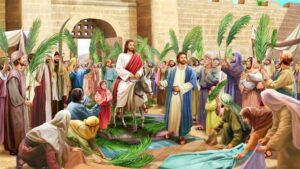
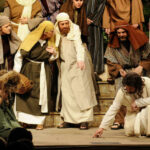
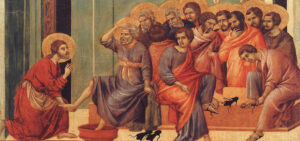
One thought on “Gospels Cut from Jewish Scriptures, #6”